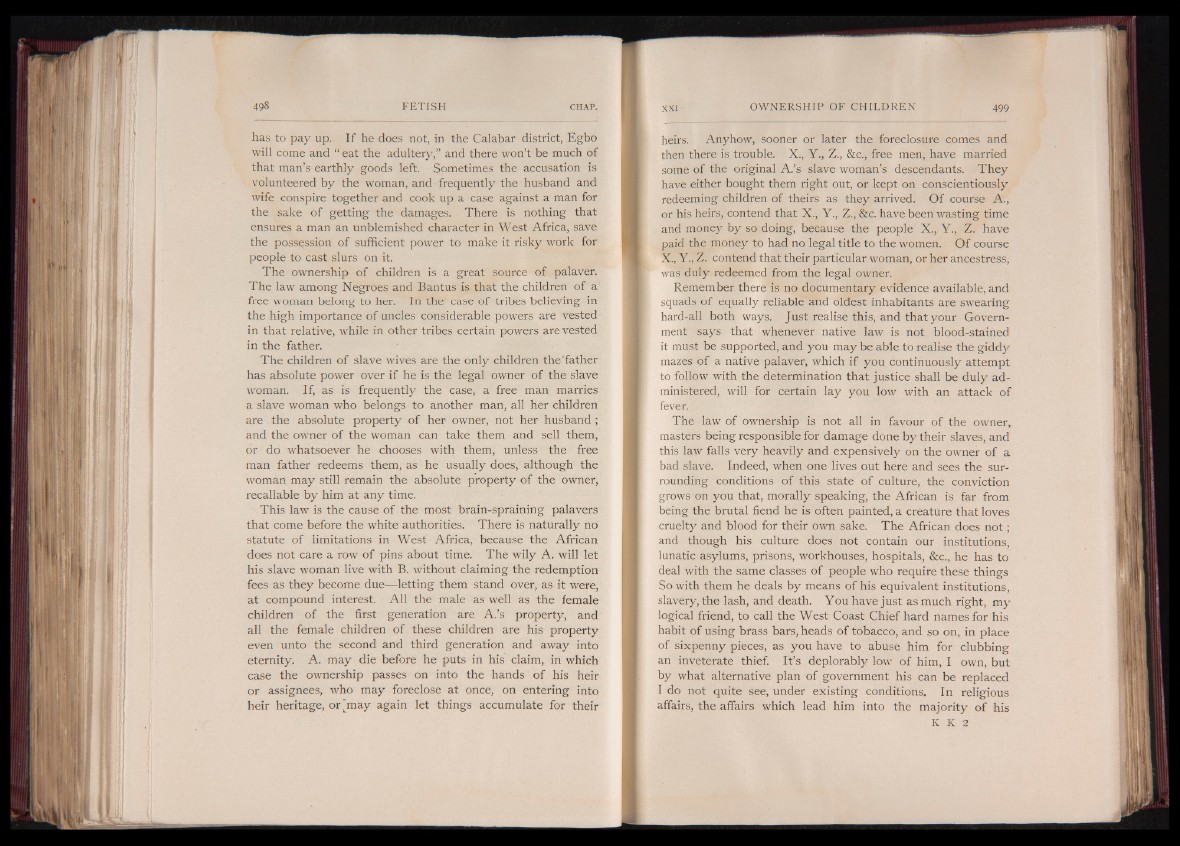
has to pay up. If he does not, in the Calabar district, Egbo
will come and eat the adultery,” and there won’t be much of
that man’s earthly goods left. Sometimes the accusation is
volunteered by the woman, and frequently the husband and
wife conspire together and cook up a case against a man for
the sake of getting the damages. There is nothing that
ensures a man an unblemished character in West Africa, save
the possession of sufficient power to make it risky work for
people to cast slurs on it.
The ownership of children is a great source of palaver.
The law among Negroes and Bantus is that the children of a
free woman belong to her. In the case of tribes believing in
the high importance of uncles considerable powers are vested
in that relative, while in other tribes certain powers are vested
in the father.
The children of slave wives are the only children the‘father
has absolute power over if he is the legal owner of the slave
woman. If, as is frequently the case, a free man marries
a slave woman who belongs to another man, all her children
are the absolute property of her owner, not her husband;
and the owner of the woman can take them and sell them,
or do whatsoever he chooses with them, unless the free
man father redeems them, as he usually does, although the
woman may still remain the absolute property of the owner,
recallable by him at any time.
This law is the cause of the most brain-spraining palavers
that come before the white authorities. There is naturally no
statute of limitations in West Africa, because the African
does not care a row of pins about time. The wily A. will let
his slave woman live with B. without claiming the redemption
fees as they become due— letting them stand over, as it were,
at compound interest. All the male as well as the female
children of the first generation are A.’s property, and
all the female children of these children are his property
even unto the second and third generation and away into
eternity. A. may die before he puts in his claim, in which
case the ownership passes on into the hands of his heir
or assignees, who may foreclose at once, on entering into
heir heritage, or'may again let things accumulate for their
heirs. Anyhow, sooner or later the foreclosure comes and
then there is trouble. X., Y., Z., &c., free men, have married
some of the original A.’s slave woman’s descendants. They
have either bought them right out, or kept on conscientiously
redeeming children of theirs as they arrived. Of course A.,
or his heirs, contend that X., Y., Z., See. have been wasting time
and money by so doing, because the people X., Y., Z. have
paid the money to had no legal title to the women. O f course
X., Y., Z. contend that their particular woman, or her ancestress,
was duly redeemed from the legal owner.
Remember there is no documentary evidence available, and
squads of equally reliable and oldest inhabitants are swearing
hard-all both ways. Just realise this, and that your Government
says that whenever native law is not blood-stained
it must be supported, and you may be able to realise the giddy
mazes of a native palaver, which if you continuously attempt
to follow with the determination that justice shall be duly administered,
will for certain lay you low with an attack of
fever.
The law of ownership is not all in favour of the owner,
masters being responsible for damage done by their slaves, and
this law falls very heavily and expensively on the owner of a
bad slave. Indeed, when one lives out here and sees the surrounding
conditions of this state of culture, the conviction
grows on you that, morally speaking, the African is far from
being the brutal fiend he is often painted, a creature that loves
cruelty and blood for their own sake. The African does n o t;
and though his culture does not contain our institutions,
lunatic asylums, prisons, workhouses, hospitals, &c., he has to
deal with the same classes of people who require these things
So with them he deals by means of his equivalent institutions,
slavery, the lash, and death. You have just as much right, my
logical friend, to call the West Coast Chief hard names for his
habit of using brass bars, heads of tobacco, and so on, in place
of sixpenny pieces, as you have to abuse him for clubbing
an inveterate thief. It’s deplorably low of him, I own, but
by what alternative plan of government his can be replaced
I do not quite see, under existing conditions. In religious
affairs, the affairs which lead him into the majority of his